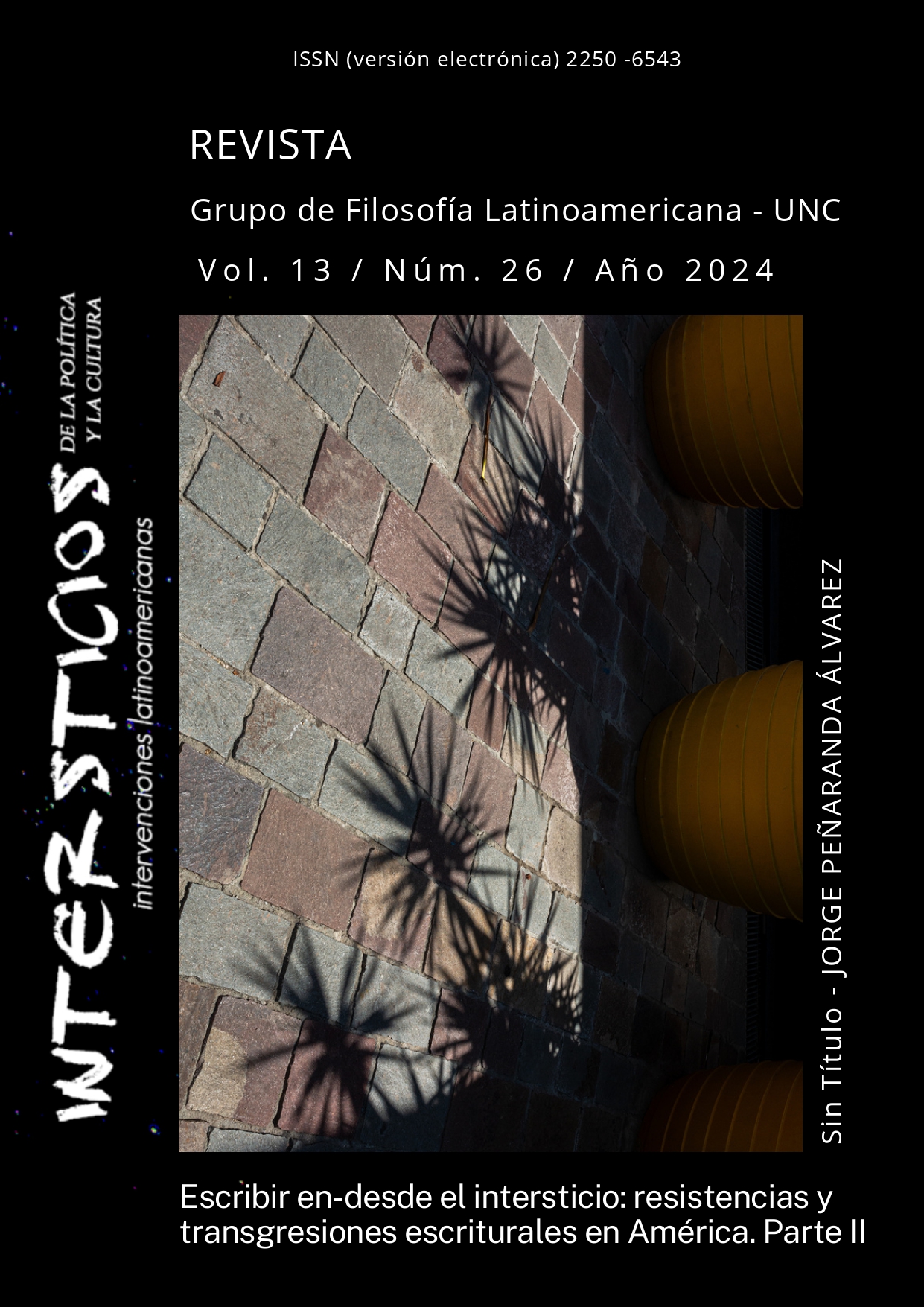Assembling memory from the language of exile. Writing and translation in El azul de las abejas by Laura Alcoba and La resistencia by Julián Fuks.
Keywords:
memory, children, exile, language, literary aesthetics, testimonyAbstract
In this article we look at the production processes of two novels that were originally written in the language of exile. We refer to Laura Alcoba's third novel El azul de las abejas (2018), whose original language of publication is French, and to La resistencia (2018), which was written in Portuguese by Julián Fuks, the son of Argentines born in exile in São Paulo, Brazil. We work with the works translated into Spanish in order to problematise how the children of authors and narrators weave memory from the translated language. We highlight the fact that we are dealing with entrepreneurial sons and daughters of memory (Jelin, 2021) and storytellers (Nofal 2022, 2023) who resort to different uses of language to narrate not only from personal testimony, but also from the fictional configuration that they enable from the intimate. Taking into account the work of the sons and daughters of a second generation (Basile, 2019) we seek to distinguish how literature shapes a narrative memory that prevails in contemporaneity in order to understand the struggles of the past. Literary aesthetics is observed in the crossover between mother tongue and language of exile. The mother tongue is presented through the work of translation.
Therefore, the language of exile, in the chosen works, constitutes a narrative memory that prevails and allows these children to expand the testimony of the terrorism that has triggered and wounded the mother tongue.
Downloads
References
Alcoba, Laura. (2007). La casa de los conejos. Buenos Aires: Edhasa.
Alcoba, Laura. (2017). La danza de la araña. Buenos Aires: Edhasa.
Alcoba, Laura. (2018). El azul de las abejas. Buenos Aires: Edhasa.
Arfuch, Leonor. (2018). La vida narrada. Memoria, subjetividad y política. Córdoba-Argentina: Eduvim.
Argañaraz, Eugenia. “La conformación de la memoria transmedial en la obra de una artista visual que escribe”. Universum. Revista de Humanidades y Ciencias Sociales. Vol. 38, núm. 2 (2023).
Basile, Teresa. (2023). Narrar los 70´desde el dispositivo de género: entre el testimonio y las militancias. En Basile, T y Chiani, M. (Comps.). Inscripciones de una revuelta. Testimonios del terrorismo sexuado. (Pp. 21-69). La Plata: EDULP.
Basile, Teresa. (2022). El dilema de narrar el mal radical. En Montealegre Alegría, N y Sapriza, G (Editoras). Infancias en dictadura. Sobre narrativa, arte y política. Uruguay. Universidad de la República: Edición de la Facultad de Humanidades y Ciencias de la Educación (FHCE).
Basile, Teresa. (2019). Infancias. La narrativa argentina de HIJOS. Córdoba-Argentina: Eduvim.
Cassigoli, Rossana. (2016). El exilio como síntoma. Literatura y fuentes. México: Ediciones metales pesados de la Universidad Nacional Autónoma de México.
Di Meglio, Estefanía. (2021). Entrevista con Julián Fuks. Revista Estudios de Teoría Literaria. Vol. 22, año 10.
Fuks, Julián. (2018). La resistencia. Buenos Aires: Random House.
Jelin, Elizabeth. (2021). Los trabajos de la memoria. Argentina: Fondo de Cultura Económica de Argentina.
Jelin, Elizabeth. (2017). La lucha por el pasado. Cómo construimos la memoria social. Argentina: Siglo veintiuno editores.
Jelin, Elizabeth y Longoni, Ana. (Comps.). (2005). Escrituras, imágenes y escenarios ante la represión. España: Siglo veintiuno Editores.
Lampasona, Julieta. (2023). Clase núm. 2 correspondiente al curso de Posgrado: ¿Cómo estudiamos las memorias sociales? Dictado en el CIS-IDES/CONICET-UNTREF. Primera cohorte.
Ludmer, Josefina. (2010). Aquí América Latina. Una especulación. Buenos Aires: Eterna Cadencia.
Mateo Leivas, Lidia. (2022). Imaginarios de la clandestinidad. Complicidad, memoria y emoción en nueve tramas. España: Akal.
Nofal, Rossana. (2023). La pastoral revolucionaria: del testimonio al cuento de guerra. En Basile, Teresa y Chiani, Miriam (Comps.). Inscripciones de una revuelta. Testimonios del terrorismo sexuado. (Pp. 414-432). La Plata: EDULP.
Nofal, Rossana. (2022). Cuentos de guerra. Santa Fe: Vera Cartonera Editorial (colección almanaque).
Nofal, Rossana. (2015). Configuraciones metafóricas en la narrativa argentina sobre memorias de dictaduras. Kamchatka. Recuperado en: https://ojs.uv.es/index.php/kamchatka/article/view/7603
Peller, Mariela. (2023). La intimidad de la Revolución. Afectos y militancia en la guerrilla del PRT-ERP. Buenos Aires: Prometeo Editorial.
Downloads
Published
Issue
Section
License

This work is licensed under a Creative Commons Attribution-NonCommercial-ShareAlike 4.0 International License.
Authors who have publications with this journal agree to the following terms:
a. Authors will retain their copyright and grant the journal the right of first publication of their work, which will simultaneously be subject to the Creative Commons Attribution License that allows third parties to share the work as long as its author and first publication in this journal are indicated.
b. Authors may adopt other non-exclusive license agreements for distribution of the published version of the work (e.g., deposit it in an institutional telematic archive or publish it in a monographic volume) as long as the initial publication in this journal is indicated.
c. Authors are allowed and encouraged to disseminate their work through the Internet (e.g., in institutional telematic archives or on their web page) after the publication process, which may produce interesting exchanges and increase citations of the published work (see The effect of open access).











